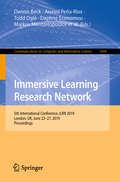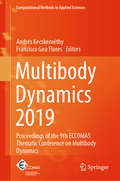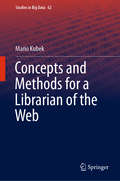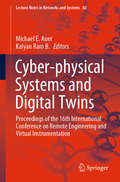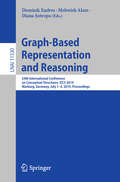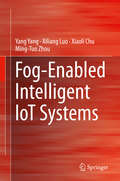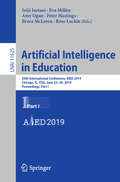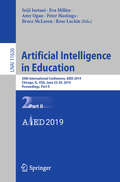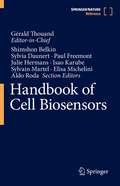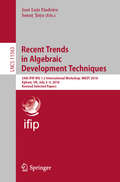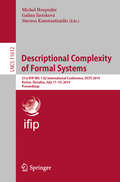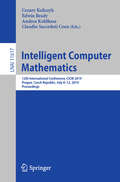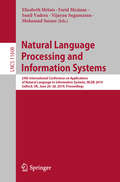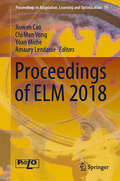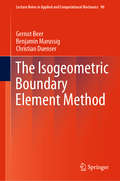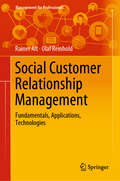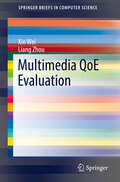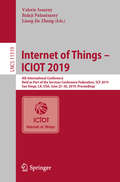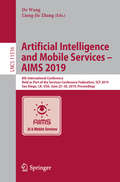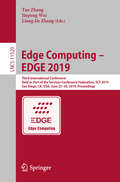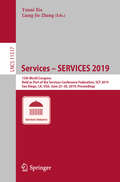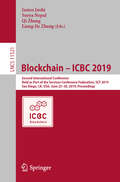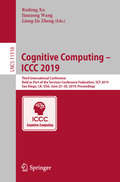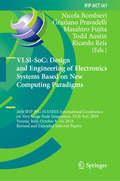- Table View
- List View
Immersive Learning Research Network: 5th International Conference, iLRN 2019, London, UK, June 23–27, 2019, Proceedings (Communications in Computer and Information Science #1044)
by Leonel Morgado Johanna Pirker Dennis Beck Jonathon Richter Christian Gütl Anasol Peña-Rios Todd Ogle Daphne Economou Markos Mentzelopoulos Christian Eckhardt Roxane Koitz-Hristov Michael GardnerThis volume constitutes the refereed proceedings of the 5th International Conference of the Immersive Learning Network, iLRN 2019, held in London, UK, in June 2019.The 18 revised full papers and presented in this volume were carefully reviewed and selected from 60 submissions. The papers are organized in topical sections on science, technology, engineering, and mathematics (STEM); disciplinary applications: special education; disciplinary applications: history; pedagogical strategies; immersion and presence.
Multibody Dynamics 2019: Proceedings of the 9th ECCOMAS Thematic Conference on Multibody Dynamics (Computational Methods in Applied Sciences #53)
by Andrés Kecskeméthy Francisco Geu FloresIn this work, outstanding, recent developments in various disciplines, such as structural dynamics, multiphysic mechanics, computational mathematics, control theory, biomechanics, and computer science, are merged together in order to provide academicians and professionals with methods and tools for the virtual prototyping of complex mechanical systems. Each chapter of the work represents an important contribution to multibody dynamics, a discipline that plays a central role in the modelling, analysis, simulation and optimization of mechanical systems in a variety of fields and for a wide range of applications.
Concepts and Methods for a Librarian of the Web (Studies in Big Data #62)
by Mario KubekThe World Wide Web can be considered a huge library that in consequence needs a capable librarian responsible for the classification and retrieval of documents as well as the mediation between library resources and users. Based on this idea, the concept of the “Librarian of the Web” is introduced which comprises novel, librarian-inspired methods and technical solutions to decentrally search for text documents in the web using peer-to-peer technology.The concept’s implementation in the form of an interactive peer-to-peer client, called “WebEngine”, is elaborated on in detail. This software extends and interconnects common web servers creating a fully integrated, decentralised and self-organising web search system on top of the existing web structure. Thus, the web is turned into its own powerful search engine without the need for any central authority.This book is intended for researchers and practitioners having a solid background in the fields of Information Retrieval and Web Mining.
Cyber-physical Systems and Digital Twins: Proceedings of the 16th International Conference on Remote Engineering and Virtual Instrumentation (Lecture Notes in Networks and Systems #80)
by Michael Auer Kalyan B.This book constitutes the proceedings of the 16th International Conference on Remote Engineering and Virtual Instrumentation (REV), held at the BMS College of Engineering, Bangalore, India on 3–6 February 2019. Today, online technologies are at the core of most fields of engineering, as well as of society as a whole, and are inseparably connected with Internet of Things,cyber-physical systems,collaborative networks and grids,cyber cloud technologies,service architectures, to name but a few. Since it was first held in, 2004, the REV conference has focused on the increasing use of the Internet for engineering tasks and the problems surrounding it. The 2019 conference demonstrated and discussed the fundamentals, applications and experiences in the field of online engineering and virtual instrumentation. It also presented guidelines for university-level courses on these topics, in view of the increasing globalization of education and the demand for teleworking, remote services and collaborative working environments.
Graph-Based Representation and Reasoning: 24th International Conference on Conceptual Structures, ICCS 2019, Marburg, Germany, July 1–4, 2019, Proceedings (Lecture Notes in Computer Science #11530)
by Dominik Endres Mehwish Alam Diana ŞotropaThis book constitutes the proceedings of the 24th International Conference on Conceptual Structures, ICCS 2019, held in Marburg, Germany, in July 2019. The 14 full papers and 6 short papers presented were carefully reviewed and selected from 29 submissions. The proceedings also include one of the two invited talks. The papers focus on the representation of and reasoning with conceptual structures in a variety of contexts. ICCS 2019's theme was entitled "Graphs in Human and Machine Cognition."
Fog-Enabled Intelligent IoT Systems
by Yang Yang Xiliang Luo Xiaoli Chu Ming-Tuo ZhouThis book first provides a comprehensive review of state-of-the-art IoT technologies and applications in different industrial sectors and public services. The authors give in-depth analyses of fog computing architecture and key technologies that fulfill the challenging requirements of enabling computing services anywhere along the cloud-to-thing continuum. Further, in order to make IoT systems more intelligent and more efficient, a fog-enabled service architecture is proposed to address the latency requirements, bandwidth limitations, and computing power issues in realistic cross-domain application scenarios with limited priori domain knowledge, i.e. physical laws, system statuses, operation principles and execution rules. Based on this fog-enabled architecture, a series of data-driven self-learning applications in different industrial sectors and public services are investigated and discussed, such as robot SLAM and formation control, wireless network self-optimization, intelligent transportation system, smart home and user behavior recognition. Finally, the advantages and future directions of fog-enabled intelligent IoT systems are summarized. Provides a comprehensive review of state-of-the-art IoT technologies and applications in different industrial sectors and public servicesPresents a fog-enabled service architecture with detailed technical approaches for realistic cross-domain application scenarios with limited prior domain knowledgeOutlines a series of data-driven self-learning applications (with new algorithms) in different industrial sectors and public services
Artificial Intelligence in Education: 20th International Conference, AIED 2019, Chicago, IL, USA, June 25-29, 2019, Proceedings, Part I (Lecture Notes in Computer Science #11625)
by Seiji Isotani Eva Millán Amy Ogan Peter Hastings Bruce McLaren Rose LuckinThis two-volume set LNCS 11625 and 11626 constitutes the refereed proceedings of the 20th International Conference on Artificial Intelligence in Education, AIED 2019, held in Chicago, IL, USA, in June 2019. The 45 full papers presented together with 41 short, 10 doctoral consortium, 6 industry, and 10 workshop papers were carefully reviewed and selected from 177 submissions. AIED 2019 solicits empirical and theoretical papers particularly in the following lines of research and application: Intelligent and interactive technologies in an educational context; Modelling and representation; Models of teaching and learning; Learning contexts and informal learning; Evaluation; Innovative applications; Intelligent techniques to support disadvantaged schools and students, inequity and inequality in education.
Artificial Intelligence in Education: 20th International Conference, AIED 2019, Chicago, IL, USA, June 25-29, 2019, Proceedings, Part II (Lecture Notes in Computer Science #11626)
by Seiji Isotani Eva Millán Amy Ogan Peter Hastings Bruce McLaren Rose LuckinThis two-volume set LNCS 11625 and 11626 constitutes the refereed proceedings of the 20th International Conference on Artificial Intelligence in Education, AIED 2019, held in Chicago, IL, USA, in June 2019. The 45 full papers presented together with 41 short, 10 doctoral consortium, 6 industry, and 10 workshop papers were carefully reviewed and selected from 177 submissions. AIED 2019 solicits empirical and theoretical papers particularly in the following lines of research and application: Intelligent and interactive technologies in an educational context; Modelling and representation; Models of teaching and learning; Learning contexts and informal learning; Evaluation; Innovative applications; Intelligent techniques to support disadvantaged schools and students, inequity and inequality in education.
Handbook of Cell Biosensors
by Shimshon Belkin Sylvia Daunert Paul Freemont Julie Hermans Isao Karube Sylvain Martel Elisa Michelini Aldo RodaThis handbook is an interdisciplinary and comprehensive reference covering all aspects of cell biosensors. It is divided into four main sections which are led and organized by numerous international experts. The scope of coverage includes: Fundamentals and genetics for biosensor applicationsTransducers, Materials and SystemsMarkets, innovation and educationApplication of biosensors in business Biosensor research is an exciting hybrid world where biologists, chemists, physicists, engineers and computer engineers come together. This handbook will serve as an invaluable living resource for all researchers in academia and industry working with cell biosensors.
Recent Trends in Algebraic Development Techniques: 24th IFIP WG 1.3 International Workshop, WADT 2018, Egham, UK, July 2–5, 2018, Revised Selected Papers (Lecture Notes in Computer Science #11563)
by José Luiz Fiadeiro Ionuț ȚuțuThis book constitutes the thoroughly refereed post-conference proceedings of the 24th IFIP WG 1.3 International Workshop on Algebraic Development Techniques, WADT 2018, held in Egham, UK in July 2018. The 9 revised papers presented were carefully reviewed and selected from 13 submissions. The contributed presentations covered a range of topics: specification and modelling languages such as CASL, Event-B, Maude, MMT, and SRML; foundations of system specification such as graph transformation, categorical semantics, fuzzy and temporal logics, institutions, module systems and parameterization, refinement, static analysis, and substitutions; and applications including categorical programming, communicating finite state machines, neuralsymbolicintegration, relational databases, and service-oriented computing.
Descriptional Complexity of Formal Systems: 21st IFIP WG 1.02 International Conference, DCFS 2019, Košice, Slovakia, July 17–19, 2019, Proceedings (Lecture Notes in Computer Science #11612)
by Michal Hospodár Galina Jirásková Stavros KonstantinidisThis book constitutes the proceedings of the 21st International Conference on Descriptional Complexity of Format Systems, DCFS 2019, held in Košice, Slovakia, in July 2019. The 18 full papers presented in this volume were carefully reviewed and selected from 25 submissions. The book also contains 4 invited talks. They deal with all aspects of descriptional complexity and costs of description of objects in various computational models, such as Turing machines, pushdown automata, finite automata, grammars, and others.
Intelligent Computer Mathematics: 12th International Conference, CICM 2019, Prague, Czech Republic, July 8–12, 2019, Proceedings (Lecture Notes in Computer Science #11617)
by Cezary Kaliszyk Edwin Brady Andrea Kohlhase Claudio Sacerdoti CoenThis book constitutes the refereed proceedings of the 12th International Conference on Intelligent Computer Mathematics, CICM 2019, held in Prague, Czech Republic, in July 2019. The 19 full papers presented were carefully reviewed and selected from a total of 41 submissions. The papers focus on digital and computational solutions which are becoming the prevalent means for the generation, communication, processing, storage and curation of mathematical information. Separate communities have developed to investigate and build computer based systems for computer algebra, automated deduction, and mathematical publishing as well as novel user interfaces. While all of these systems excel in their own right, their integration can lead to synergies offering significant added value.
Natural Language Processing and Information Systems: 24th International Conference on Applications of Natural Language to Information Systems, NLDB 2019, Salford, UK, June 26–28, 2019, Proceedings (Lecture Notes in Computer Science #11608)
by Elisabeth Métais Farid Meziane Sunil Vadera Vijayan Sugumaran Mohamad SaraeeThis book constitutes the refereed proceedings of the 24th International Conference on Applications of Natural Language to Information Systems, NLDB 2019, held in Salford, UK, in June 2019. The 21 full papers and 16 short papers were carefully reviewed and selected from 75 submissions. The papers are organized in the following topical sections: argumentation mining and applications; deep learning, neural languages and NLP; social media and web analytics; question answering; corpus analysis; semantic web, open linked data, and ontologies; natural language in conceptual modeling; natural language and ubiquitous computing; and big data and business intelligence.
Proceedings of ELM 2018 (Proceedings in Adaptation, Learning and Optimization #11)
by Jiuwen Cao Chi Man Vong Yoan Miche Amaury LendasseThis book contains some selected papers from the International Conference on Extreme Learning Machine 2018, which was held in Singapore, November 21–23, 2018. This conference provided a forum for academics, researchers and engineers to share and exchange R&D experience on both theoretical studies and practical applications of the ELM technique and brain learning.Extreme Learning Machines (ELM) aims to enable pervasive learning and pervasive intelligence. As advocated by ELM theories, it is exciting to see the convergence of machine learning and biological learning from the long-term point of view. ELM may be one of the fundamental “learning particles” filling the gaps between machine learning and biological learning (of which activation functions are even unknown). ELM represents a suite of (machine and biological) learning techniques in which hidden neurons need not be tuned: inherited from their ancestors or randomly generated. ELM learning theories show that effective learning algorithms can be derived based on randomly generated hidden neurons (biological neurons, artificial neurons, wavelets, Fourier series, etc.) as long as they are nonlinear piecewise continuous, independent of training data and application environments. Increasingly, evidence from neuroscience suggests that similar principles apply in biological learning systems. ELM theories and algorithms argue that “random hidden neurons” capture an essential aspect of biological learning mechanisms as well as the intuitive sense that the efficiency of biological learning need not rely on computing power of neurons. ELM theories thus hint at possible reasons why the brain is more intelligent and effective than current computers. The main theme of ELM2018 is Hierarchical ELM, AI for IoT, Synergy of Machine Learning and Biological Learning.This book covers theories, algorithms and applications of ELM. It gives readers a glance at the most recent advances of ELM.
The Isogeometric Boundary Element Method (Lecture Notes in Applied and Computational Mechanics #90)
by Gernot Beer Benjamin Marussig Christian DuenserThis book discusses the introduction of isogeometric technology to the boundary element method (BEM) in order to establish an improved link between simulation and computer aided design (CAD) that does not require mesh generation. In the isogeometric BEM, non-uniform rational B-splines replace the Lagrange polynomials used in conventional BEM. This may seem a trivial exercise, but if implemented rigorously, it has profound implications for the programming, resulting in software that is extremely user friendly and efficient. The BEM is ideally suited for linking with CAD, as both rely on the definition of objects by boundary representation. The book shows how the isogeometric philosophy can be implemented and how its benefits can be maximised with a minimum of user effort. Using several examples, ranging from potential problems to elasticity, it demonstrates that the isogeometric approach results in a drastic reduction in the number of unknowns and an increase in the quality of the results. In some cases even exact solutions without refinement are possible. The book also presents a number of practical applications, demonstrating that the development is not only of academic interest. It then elegantly addresses heterogeneous and non-linear problems using isogeometric concepts, and tests them on several examples, including a severely non-linear problem in viscous flow. The book makes a significant contribution towards a seamless integration of CAD and simulation, which eliminates the need for tedious mesh generation and provides high-quality results with minimum user intervention and computing.
Social Customer Relationship Management: Fundamentals, Applications, Technologies (Management for Professionals)
by Rainer Alt Olaf ReinholdSocial media has received considerable attention, and many potential benefits, as well as concerns, are now being discussed. This book explores how social media can successfully support business processes in marketing, sales and service in the context of customer relationship management (CRM). It presents the fundamentals of Social CRM and shows how small and large companies alike have implemented it.In turn, the book presents analytic and operational software tools that offer features for enhancing and streamlining interactions with customers. The book concludes with an overview of essential design areas that businesses need to bear in mind when introducing social media into their CRM strategies. In this regard, it also points out key success factors, limitations, and data protection aspects.
Multimedia QoE Evaluation (SpringerBriefs in Computer Science)
by Xin Wei Liang ZhouThis SpringerBrief discusses the most recent research in the field of multimedia QoE evaluation, with a focus on how to evaluate subjective multimedia QoE problems from objective techniques. Specifically, this SpringerBrief starts from a comprehensive overview of multimedia QoE definition, its influencing factors, traditional modeling and prediction methods. Subsequently, the authors introduce the procedure of multimedia service data collection, preprocessing and feature extractions. Then, describe several proposed multimedia QoE modeling and prediction techniques in details. Finally, the authors illustrate how to implement and demonstrate multimedia QoE evaluation in the big data platform. This SpringerBrief provides readers with a clear picture on how to make full use of multimedia service data to realize multimedia QoE evaluation. With the exponential growth of the Internet technologies, multimedia services become immensely popular. Users can enjoy multimedia services from operators or content providers by TV, computers and mobile devices. User experience is important for network operators and multimedia content providers. Traditional QoS (quality of service) can not entirely and accurately describe user experience. It is natural to research the quality of multimedia service from the users’ perspective, defined as multimedia quality of experience (QoE). However, multimedia QoE evaluation is difficult, because user experience is abstract and subjective, hard to quantify and measure. Moreover, the explosion of multimedia service and emergence of big data, all call for a new and better understanding of multimedia QoE.This SpringerBrief targets advanced-level students, professors and researchers studying and working in the fields of multimedia communications and information processing. Professionals, industry managers, and government research employees working in these same fields will also benefit from this SpringerBrief.
Internet of Things – ICIOT 2019: 4th International Conference, Held as Part of the Services Conference Federation, SCF 2019, San Diego, CA, USA, June 25–30, 2019, Proceedings (Lecture Notes in Computer Science #11519)
by Valerie Issarny Balaji Palanisamy Liang-Jie ZhangThis book constitutes the proceedings of the International Conference on Internet of Things, ICIOT 2019, held as part of SCF 2019, in San Diego, CA, USA, in June 2019. The 8 full and 3 short papers presented in this volume were carefully reviewed and selected from 16 submissions. With the rapid advancements of mobile Internet, cloud computing and big data, device-centric traditional Internet of Things (IoT) is now moving into a new era which is termed as Internet of Things Services (IOTS). In this era, sensors and other types of sensing devices, wired and wireless networks, platforms and tools, data processing/visualization/analysis and integration engines, and other components of traditional IoT are interconnected through innovative services to realize the value of connected things, people, and virtual Internet spaces.
Segmentation and Separation of Overlapped Latent Fingerprints: Algorithms, Techniques, and Datasets (SpringerBriefs in Computer Science)
by Branka Stojanović Oge Marques Aleksandar NeškovićThis Springerbrief presents an overview of problems and technologies behind segmentation and separation of overlapped latent fingerprints, which are two fundamental steps in the context of fingerprint matching systems. It addresses five main aspects: (1) the need for overlapped latent fingerprint segmentation and separation in the context of fingerprint verification systems; (2) the different datasets available for research on overlapped latent fingerprints; (3) selected algorithms and techniques for segmentation of overlapped latent fingerprints; (4) selected algorithms and techniques for separation of overlapped latent fingerprints; and (5) the use of deep learning techniques for segmentation and separation of overlapped latent fingerprints.By offering a structured overview of the most important approaches currently available, putting them in perspective, and suggesting numerous resources for further exploration, this book gives its readers a clear path for learning new topics and engaging in related research. Written from a technical perspective, and yet using language and terminology accessible to non-experts, it describes the technologies, introduces relevant datasets, highlights the most important research results in each area, and outlines the most challenging open research questions.This Springerbrief targets researchers, professionals and advanced-level students studying and working in computer science, who are interested in the field of fingerprint matching and biometrics. Readers who want to deepen their understanding of specific topics will find more than one hundred references to additional sources of related information.
Artificial Intelligence and Mobile Services – AIMS 2019: 8th International Conference, Held as Part of the Services Conference Federation, SCF 2019, San Diego, CA, USA, June 25–30, 2019, Proceedings (Lecture Notes in Computer Science #11516)
by De Wang Liang-Jie ZhangThis book constitutes the proceedings of the 8th International Conference on Artificial Intelligence and Mobile Services, AIMS 2019, held as part of SCF 2019, in San Diego, CA, USA, in June 2019. The 12 full papers and one short paper presented were carefully reviewed and selected from 29 submissions. The papers cover different aspects of mobile services from business management to computing systems, algorithms and applications. They promote technological technological innovations in research and development of mobile services, including, but not limited to, wireless and sensor networks, mobile and wearable computing, mobile enterprise and eCommerce, ubiquitous collaborative and social services, machine-to-machine and Internet-of-things, clouds, cyber-physical integration, and big data analytics for mobility-enabled services.
Edge Computing – EDGE 2019: Third International Conference, Held as Part of the Services Conference Federation, SCF 2019, San Diego, CA, USA, June 25–30, 2019, Proceedings (Lecture Notes in Computer Science #11520)
by Tao Zhang Jinpeng Wei Liang-Jie ZhangThis book constitutes the proceedings of the Third International Conference on Edge Computing, EDGE 2019, held in San Diego, CA, USA, in June 2019. The 5 full papers and 1 short paper presented in this volume were carefully reviewed and selected from 14 submissions. The contributions deal with the latest fundamental advances in the state of the art and practice of edge computing, identifying emerging research topics and defining the future of edge computing.
Services – SERVICES 2019: 15th World Congress, Held as Part of the Services Conference Federation, SCF 2019, San Diego, CA, USA, June 25–30, 2019, Proceedings (Lecture Notes in Computer Science #11517)
by Yunni Xia Liang-Jie ZhangThis book constitutes the refereed proceedings of the 15th World Congress on Services, SERVICES 2019, held as part of the Services Conference Federation, SCF 2019, in San Diego, USA, in June 2019.The 11 full papers and 2 short papers presented were carefully reviewed and selected from 14 submissions. The papers cover topics in the field of software engineering foundations and applications with a focus on novel approaches for engineering requirements, design and architectures, testing, maintenance and evolution, model-driven development, software processes, metrics, quality assurance and new software economics models, search-based software engineering, benefiting day-to-day services sectors and derived through experiences, with appreciation to scale, pragmatism, transparency, compliance and/or dependability.
Blockchain – ICBC 2019: Second International Conference, Held as Part of the Services Conference Federation, SCF 2019, San Diego, CA, USA, June 25–30, 2019, Proceedings (Lecture Notes in Computer Science #11521)
by James Joshi Surya Nepal Qi Zhang Liang-Jie ZhangThis book constitutes the refereed proceedings of the Second International Conference on Blockchain, ICBC 2019, held as part of the Services Conference Federation, SCF 2019, in San Diego, CA, USA, in June 2019. The 13 full papers and 2 short papers presented were carefully reviewed and selected from 29 submissions. The papers cover a wide range of topics in blockchain technologies, platforms, solutions and business models such as new blockchain architecture, platform constructions, blockchain development and blockchain services technologies, as well as standards, and blockchain services innovation lifecycle including enterprise modeling, business consulting, solution creation, services orchestration, services optimization, services management, services marketing, business process integration and management.
Cognitive Computing – ICCC 2019: Third International Conference, Held as Part of the Services Conference Federation, SCF 2019, San Diego, CA, USA, June 25–30, 2019, Proceedings (Lecture Notes in Computer Science #11518)
by Ruifeng Xu Jianzong Wang Liang-Jie ZhangThis book constitutes the proceedings of the International Conference on Cognitive Computing, ICCC 2019, held as part of SCF 2019, in San Diego, CA, USA, in June 2019. The 14 full and 3 short papers presented in this volume were carefully reviewed and selected from 42 submissions. The papers cover all aspects of Sensing Intelligence (SIJ as a Service (SlaaS). Cognitive Computing is a sensing-driven computing (SDC) scheme that explores and integrates intelligence from all types of senses in various scenarios and solution contexts
VLSI-SoC: 26th IFIP WG 10.5/IEEE International Conference on Very Large Scale Integration, VLSI-SoC 2018, Verona, Italy, October 8–10, 2018, Revised and Extended Selected Papers (IFIP Advances in Information and Communication Technology #561)
by Ricardo Reis Masahiro Fujita Nicola Bombieri Graziano Pravadelli Todd AustinThis book contains extended and revised versions of the best papers presented at the 26th IFIP WG 10.5/IEEE International Conference on Very Large Scale Integration, VLSI-SoC 2018, held in Verona, Italy, in October 2018. The 13 full papers included in this volume were carefully reviewed and selected from the 27 papers (out of 106 submissions) presented at the conference. The papers discuss the latest academic and industrial results and developments as well as future trends in the field of System-on-Chip (SoC) design, considering the challenges of nano-scale, state-of-the-art and emerging manufacturing technologies. In particular they address cutting-edge research fields like heterogeneous, neuromorphic and brain-inspired, biologically-inspired, approximate computing systems.
